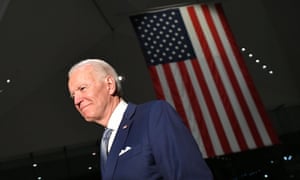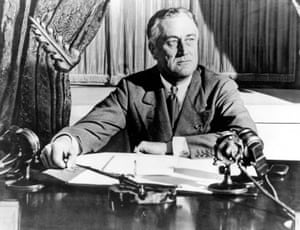Joe Biden pushed to embrace radicalism of FDR by scale of economic crisis
The presumptive Democratic nominee who once promised ‘nothing would fundamentally change’ now has a different tune

Photograph: Mandel Ngan/AFP via Getty Images
When Joe Biden launched his campaign for president in April last year, the unemployment rate was 3.6%, the lowest it had been in nearly half a century. Now, months into a once-in-a-century public health crisis, unemployment in the US is nearly four times that, soaring to levels not seen since the Great Depression.
Millions of laid-off workers risk losing their health insurance, while many Americans with jobs deemed essential are demanding better protections from their employers. It is only a matter of time before the death toll reaches 100,000.
During the Democratic primary, Biden spoke of restoring normalcy after four years of Donald Trump, frequently appealing to voters’ nostalgia for the presidency of Barack Obama. But now, as he faces the general election amid the deepening economic turmoil, the presumptive Democratic nominee is reaching for the legacy of a radical American president: Franklin Delano Roosevelt.
“The blinders have been taken off,” Biden told supporters recently during a virtual fundraiser from his Delaware home, where he has been since March. “Because of this Covid crisis, I think people are realizing, ‘My Lord, look at what is possible. Look at the institutional changes we can make.’”
In recent weeks, Biden, who has climbed above Trump in national polls, has openly courted progressive leaders and ideas, adopting some of the populist rhetoric more commonly associated with his vanquished rivals, Bernie Sanders and Elizabeth Warren. In turn, they have offered their full-throated endorsements, casting Biden, a pragmatic dealmaker who still believes in bipartisan comity, as the perhaps unlikely herald of a new progressive era.
“A shift of frame matters – it’s not to be underestimated,” the California congressman Ro Khanna, who was a co-chair of Sanders’ presidential campaign, said of Biden’s bold messaging. “It’s a totally different vision for what he thinks the next four years should be about.”
Neither Biden nor Trump has yet laid out their vision for what the first 100 days of a new presidency might look like, a benchmark established by FDR during which he offered a series of sweeping reforms.

But Biden and his economic advisers believe they must be prepared to marshal a far more ambitious domestic agenda than they initially imagined. During daily virtual meetings, Biden and his team are beginning to draft a new governing vision that reflects the scale and urgency of the crisis that Biden predicted may “eclipse what FDR faced”.
The task is not entirely new to Biden. As vice-president, he led the Obama administration’s response to the recession, and his campaign hopes to leverage his remarkably scandal-free stewardship of the nearly $800bn stimulus package with Trump’s handling of the economy.
In the coming weeks, Biden said he would share a detailed plan “for the right kind of economic recovery”, aspects of which are expected to include massive investment in public health, expansive legislative action on climate change, and broad new protections for workers.
Last week, Biden announced six policy taskforces – centered around issues that include healthcare, climate and the economy – that pair his supporters with ideological allies of Sanders. Among those chosen to participate are some of the young, progressive leaders most skeptical of his approach, including the New York congresswoman Alexandria Ocasio-Cortez.
In a joint press release announcing the taskforces, Biden said the groups would help “transform our country”.
“Vice-President Biden understands in his gut that this is a totally different order of magnitude than any president has ever dealt with,” said Mary Kay Henry, president of the Service Employees International Union and a member of the healthcare taskforce.
Henry said the coronavirus has exposed the underlying causes of the US’s problems, calling public attention to issues she believes government and business leaders can no longer afford to ignore.
“We had [38] million people that have lost jobs. But that’s on top of the 64 million Americans who already made less than $15 an hour before Covid,” she said. Without paid sick leave, some essential workers are reporting for work even if they feel ill because they can’t afford the alternative while fast-food and healthcare workers stage protests to demand protective equipment.
“That level of inequality has sort of hit people between the eyes.”
Jared Bernstein, one of Biden’s economic advisers, said Biden was looking beyond the “cyclical” challenges posed by the pandemic to the many “structural” problems it has revealed.
“Biden is, I think, developing a particularly robust agenda that really strikes at this reality that the Trump economy was built on a house of sand and has turned out to be totally non-resilient to any shock,” said Bernstein, who advised Biden during his tenure as vice-president.
Biden, Bernstein said, recognizes the need for an “urgent expansion” that better insulates the American economy from the “shocks that are coming fast and furiously” not as a direct result of the pandemic but from climate change and income inequality.
Biden has also made other gestures. He has adopted aspects of Sanders’ free college tuition proposal. He has embraced Elizabeth Warren’s bankruptcy proposal and joined with the senator, viewed as a potential running mate, to call for better oversight of how the Trump administration spends the coronavirus relief fund.
Critics on the left have scoffed at the notion of Biden as an FDR-style visionary. After all, they say, Biden once told supporters that under his presidency “nothing would fundamentally change”.
David Sirota, a former adviser to Sanders 2020 presidential campaign, dismissed Biden’s overtures to the left as performative politics – a “canned SNL skit” that progressives were being asked to accept as “something real”.
Republicans, meanwhile, view Biden’s expanding policy aspirations as a political gift. After the taskforce members were announced, the Republican National Committee tagged Biden a “banner-man for the socialist agenda”.
Biden’s policy platform – which includes a public option for healthcare and an aggressive plan to combat the climate crisis – might have been considered far-reaching in another presidential cycle. But during the primary he resisted pressure from activists to embrace progressive litmus-test items such as Medicare for All and a Green New Deal.
Campaign aides and allies say Biden’s calls for change are part of a policy evolution in response to the crisis, not a sudden embrace of a Sanders-style agenda. Biden himself has pointed to his nearly 50-year political career as a guide for how he would make “institutional” changes “without us becoming a socialist country, or any of that malarkey”.
Michael Gwin, a spokesman for Biden’s campaign, said: “He’s scaling up the solutions he’s proposed so that we can meet this moment, get through this crisis, and ensure that we come out on the other end with a stronger middle class and a more resilient country.”
Surrounding his planning for the presidency is the uncertainty over who will control the House and Senate, which is suddenly within reach for Democrats. Yet there are signs that the coronavirus, and Trump’s handling of the crisis, have scrambled the political calculus, giving Biden new latitude to move in a far bolder direction.
A recent survey by the non-partisan Pew Research Center found that the public’s view of the economy has darkened dramatically: just 23% of Americans describe the economic outlook as “excellent” or “good”, down from 57% at the start of the year. The same poll found overwhelming support for the $2tn coronavirus relief measure passed by Congress last month, a marked contrast from the polarized, partisan views of the stimulus package passed to stem the economic fallout from the Great Recession.
“I can’t underscore enough the extent to which this economic moment is unprecedented,” said Steph Sterling, vice-president of advocacy and policy at the liberal Roosevelt Institute. “Our institutions need to shift to meet the moment in a way that only government can.”




